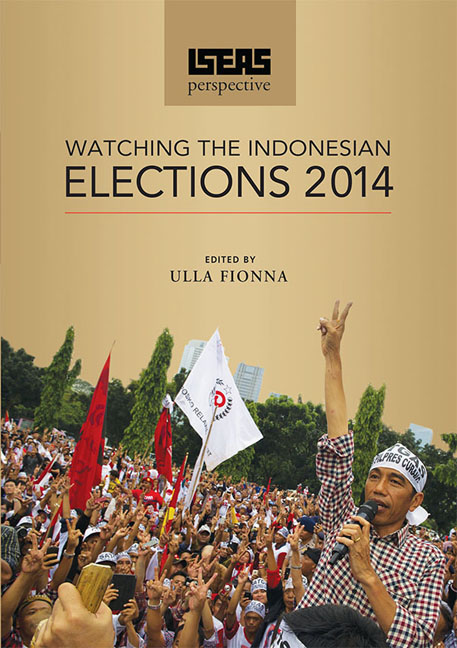Book contents
- Frontmatter
- Contents
- Foreword
- Introduction
- 1 The Gubernatorial Race in Jakarta: Background and Implications
- 2 Indonesian Parties Struggle for Electability
- 3 Who Will Be Indonesian President in 2014?
- 4 Indonesian Presidential Election Forcing Rejuvenation of Parties
- 5 Resisting Democracy: Front Pembela Islam and Indonesia's 2014 Elections
- 6 Getting to Know the Contestants of the 2014 Indonesian Parliamentary Elections
- 7 A Snapshot of the Campaigning in Indonesia's 2014 Legislative Elections
- 8 Unpacking the Results of the 2014 Indonesian Legislative Elections
- 9 Indonesia's 2014 Legislative Elections: The Dilemmas of “Elektabilitas” Politics
- 10 The Islamic Factor in the 2014 Indonesian Elections
- 11 Vote-buying in Indonesia's 2014 Elections: The Other Side of the Coin
- 12 Gap Narrows Between Candidates in Indonesian Presidential Elections
- 13 Analysing the Economic Platforms in the Indonesian Presidential Election
- 14 Indonesian Islamic Parties After the 2014 Elections: Divided and Self-Centred
- 15 Safeguarding Indonesia's Pluralism: An Essential Task for Joko Widodo
- 16 Jokowi's Key Economic Challenge: Improving Fiscal Policy for Equitable Growth
- 17 Crossing the River While Avoiding the Stones: Jokowi's Run-up to the Presidency
- 18 Post-elections Indonesia: Towards a Crisis of Government?
- Epilogue: Jokowi's First Months: Compromise Cabinet, Subsidy Cuts, and Corrupt Coalition
- Frontmatter
- Contents
- Foreword
- Introduction
- 1 The Gubernatorial Race in Jakarta: Background and Implications
- 2 Indonesian Parties Struggle for Electability
- 3 Who Will Be Indonesian President in 2014?
- 4 Indonesian Presidential Election Forcing Rejuvenation of Parties
- 5 Resisting Democracy: Front Pembela Islam and Indonesia's 2014 Elections
- 6 Getting to Know the Contestants of the 2014 Indonesian Parliamentary Elections
- 7 A Snapshot of the Campaigning in Indonesia's 2014 Legislative Elections
- 8 Unpacking the Results of the 2014 Indonesian Legislative Elections
- 9 Indonesia's 2014 Legislative Elections: The Dilemmas of “Elektabilitas” Politics
- 10 The Islamic Factor in the 2014 Indonesian Elections
- 11 Vote-buying in Indonesia's 2014 Elections: The Other Side of the Coin
- 12 Gap Narrows Between Candidates in Indonesian Presidential Elections
- 13 Analysing the Economic Platforms in the Indonesian Presidential Election
- 14 Indonesian Islamic Parties After the 2014 Elections: Divided and Self-Centred
- 15 Safeguarding Indonesia's Pluralism: An Essential Task for Joko Widodo
- 16 Jokowi's Key Economic Challenge: Improving Fiscal Policy for Equitable Growth
- 17 Crossing the River While Avoiding the Stones: Jokowi's Run-up to the Presidency
- 18 Post-elections Indonesia: Towards a Crisis of Government?
- Epilogue: Jokowi's First Months: Compromise Cabinet, Subsidy Cuts, and Corrupt Coalition
Summary
The fourth democratic elections in post-reformasi Indonesia held in 2014 proved most exciting. The country showed that it had with great success institutionalized the policies and initiatives taken within the democratization process that got underway in 2008. Most notably, it is the decentralization and the implementation of direct local elections that had “given birth” to Indonesia's seventh president, Joko Widodo or Jokowi.
But by the same token, the country continues to suffer from the dysfunctionality of the institutions and the persisting socio-economic problems. As such, Indonesia's democratic progress remains a unique one, where although elections are free and civil society is vigilant in keeping government in check, many setbacks linger. Corruption is still rampant and parties continue neglecting formulating clear platforms and policies, and instead heavily on political figures to attract votes.
The collection of articles in this volume represent close-up snapshots of numerous actors and the many issues arising during the 2014 elections. Together, the contributions demonstrate various dynamics that Indonesian voters were faced with even before the real campaign had started.
To be sure, the election of Joko Widodo as governor of Jakarta in 2012 brought a profound change that clearly influenced the subsequent campaigning methods and mechanisms adopted by parties and by individual candidates.
Several articles show how political parties struggled to improve their standing in voters’ eyes, amidst the various scandals and leadership problems that embroiled many of them more than a year before the elections. Non-mainstream actors such as the Islamic Defenders Front (FPI) also receive special attention with a contribution highlighting how these, despite their hostile stand against democracy, acted nevertheless, as vote brokers, through their manoeuvres.
Several shed light on the campaign dynamics at the grassroots level. The new trends and realities that parties and candidates faced that year were especially imperative to investigate — generally, parties took a much less determinant role while candidates occupied the centre stage. As was to be expected perhaps, old practices such as vote-buying became more sophisticated, and will most likely continue be an important feature in Indonesian elections in years to come.
The votes cast for the various parties also revealed new developments that Indonesia enthusiasts should take note of.
- Type
- Chapter
- Information
- ISEAS PerspectiveWatching the Indonesian Elections 2014, pp. xi - xiiPublisher: ISEAS–Yusof Ishak InstitutePrint publication year: 2015

